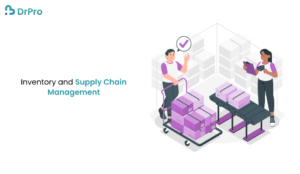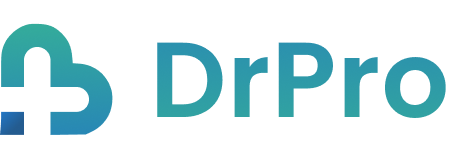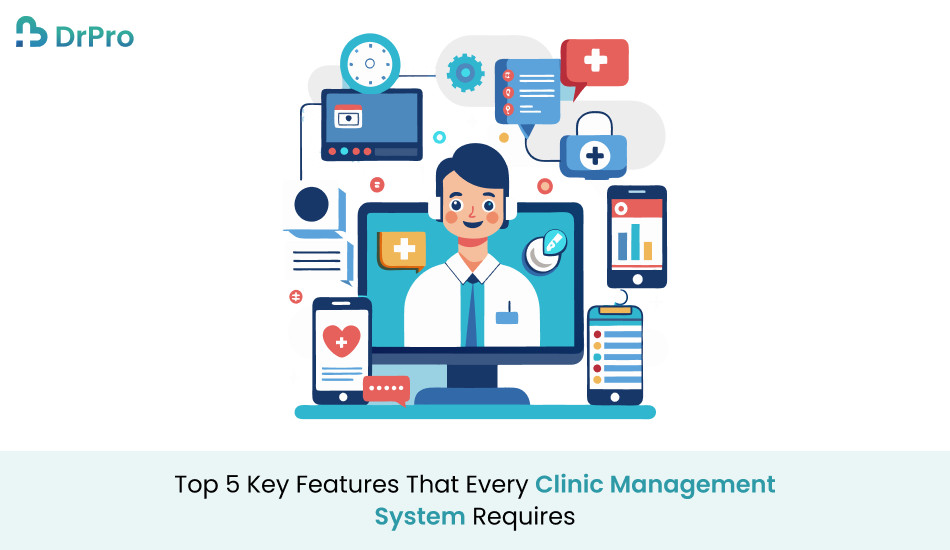In the current digital era, health issues and clinics have to constantly combine giving excellent treatment with maintaining a growing volume of work. A strong Clinic Management System (CMS) is required for improved patient care, better operations, and increased efficiency of resources. Having a CMS that is sufficient and fulfills the demands of current medical processes can have an important effect on a medical clinic’s achievement. This article covers the five key elements that any Clinic Management System must have.
Since clinics work with a huge load of information of patients, the problem of an effective, secure, and comprehensive system is significant. A good CMS should also consider functionalities such as appointment scheduling, medical records management, billing, and patient follow-ups among others. There are many different systems currently on the market, and it is crucial to find out what features are going to be valuable for your clinic.
Comprehensive Patient management
Comprehensive Patient Management is said to be one of the most important components that any DrPro‘s Clinic Management System should have. In a clinic setting, it acts as the backbone that supports a clinic and ensures that comprehensive and efficient communication takes place between the patient and members of the health care team. A good patient management module assists clinics in performing all the operations, involving patient relations, from the time they are booked in for an appointment to the time they attend a follow-up appointment after treatment, all this should be done effectively and with the best patient satisfaction and care quality. Here’s why providing this feature is important:
Patient Registration and Scheduling
Registration of patients and scheduling appointments need to have been provided by a Clinic Management System. This includes the ability for the following reasons:
Register new patients quickly and successfully, collecting important biographical and health information.
Schedule appointments quickly, with multiple choices for providers as well as patients. It also includes putting forward email or SMS notifications to reduce the number of cancellations.
Manage waiting lists and important appointments so that clients receive immediate treatment.
Electronic Health Records (EHR)
Maintaining accurate and current patient data requires the use of electronic medical records. An effective CMS is required:
Store comprehensive patient records, including before medical data, current treatments, preferences, and medications.
Facilitate authorized workers to quickly obtain medical records, ensuring that medical professionals have the information they need at their fingers.
Support interoperability to make sure health information may be smoothly exchanged with other medical professionals and networks.
Patient Communication
Improving satisfaction with care and treatment plan conformance needs efficient interaction between the clinic and consumers. A Clinic Management System should have:
automated monitoring, authorization, and reminders for appointments.
Secure messaging features allow for interaction among patients and medical professionals.
Patient portals allow access to informational resources, scheduling appointments, and health information access.
Effective Financial Management and Billing
The capability to manage the Clinic’s financial accounts and its billing is a significant component of effectively managing the practice and thus is an essential aspect to include in most Clinic Management Systems (CMS). Overall, finances in a healthcare context can be a little more complicated than in other organizational contexts as the processes involved may encompass billing, payment, insurance, and or revenue processes. Good financial management also makes these processes easier and faster thereby eliminating errors that may harm the clinic’s finances. Important elements can of the following:
Billing System Integrated
All financial transactions are handled within the CMS due to a connected billing system, that reduces mistakes and improves efficiency. Features need to consist :
automated billing processes, such as the generation of receipts and invoices.
Insurance claim management includes the ability to handle various insurance providers and store requests via the Internet.
Real-time tracking of transactions and remaining amounts provides complete financial transparency.
Financial Reporting and Analysis
Making informed business choices needs accurate financial information. A CMS should offer:
comprehensive financial reports that include the flow of funds, financial statements, and financial statement elements.
Analytics tools are used to track provider mix, income per patient, as well as other important performance metrics (KPIs).
Customized reports that respond to the clinic’s special needs.
Inventory and Supply Chain Management

Inventory and Supply Chain Management is an important component of the Clinic Management System (CMS) that enables healthcare facilities to administer their medical supplies, drugs, and equipment. Such an organizational supply system not only assists clinics in avoiding stock-outs but also minimizes cases of overstocking which may be counter-productive. This feature is important because healthcare is substantially dependent on timely and adequate medical supplies to keep its operations smooth and deliver good quality treatments to the patients. Important features of a CMS should include:
Inventory Tracking
Clinics can monitor their stocks to avoid shortages or quantity with the help of a successful system for managing inventory. It comprises:
Monitoring inventory in real-time, including expiration dates as well as low stock notifications.
Reordering processes that are controlled maintain the stock at the ideal level.
Detailed inventory reports that provide insight into expenses and patterns of consumption.
Management of the Supply Chain
Effective supply chain management ensures that clinics receive the proper goods right when they need them. A CMS should allow:
vendor management allows clinics to track their business partners’ performance and manage agreements.
Purchase order generation and tracking features are incorporated into purchase order management.
cost control using devices to track and cut expenses in the supply chain.
Support with Clinical Decision Making
Support with Clinical Decision Making is an important characteristic of a Clinic Management System that can bring about a positive change in the quality of care that is delivered to the patients as it provides the necessary tools to medical practitioners to arrive at correct, quick, and reliable decisions at the clinic level. As the healthcare sector becomes more and more dominated by data, clinics’ administrative support is not enough- clinics need knowledgeable systems that would be able to help clinicians in diagnosing patient’s conditions, prescribing treatments, or even outlining care plans based on present data and evidence-based practice. Important components consist of the following:
Evidence-based guidelines
based on scientific evidence clinical guidelines need to have been integrated into a CMS to assist providers in making informed choices:
Clinical recommendations and processes for addressing common diseases.
access to accurate sources of current healthcare recommendations and research.
information and reminders to take care of serious illnesses and receive preventative care.
Diagnostic and Treatment Support
Tools from CDS can help improve patient diagnosis and treatment. Features must consist of the following:
Diagnostic methods that allow fast and accurate diagnoses.
Medication management supplies, such as medication recommendations and medication interaction checks.
Lab test ordering and interpretation help, make sure the right tests are requested and results are successfully understood.
Data Security and Compliance
Data Security and Compliance is an important component in any CMS that would safeguard patient information as well as ensure the clinic follows the required laws in the provision of health care services The Clinic needs a CMS that addresses the following aspects. In the current technological world where there are increased cases of hacking and other cybersecurity issues, clinics are at risk and therefore must ensure the security and privacy of patients’ information accompanied by legal requirements including HIPAA in the U.S., GDPR in the EU, and other laws in other regions. Besides, this feature shields the clinic from various possible legal and financial consequences and builds patients’ trust since their data will be guarded appropriately.
Data Security
A Clinic Management System must be in place to protect patient data against intrusions and illegal access. Key safety characteristics can of the following:
Data encryption occurs both during transit and at rest.
controls on availability, making sure that personal data is only available to those with authorization.
audit trails, that provide a history of who saw or changed information about patients and when.
Regulatory Compliance
Compliance with healthcare regulations is important to avert legal issues and repercussions. A Clinic Management System should improve:
HIPAA compliance ensures that patient data will be handled by strict privacy and security regulations in the United States.
GDPR compliance in the EU, protecting patient’s private data.
Regular improvements to ensure that the system keeps up with changing legal standards.
Conclusion
Clinic Management System is an important instrument for today’s medical activities, helping clinics to run efficiently while providing excellent customer service. A CMS could transform clinic activities, improve outcomes for patients, and improve overall efficiency through the use of these five essential features: clinical decision support, efficient inventory, and supply chain management, complete handling of patients, data security and compliance, and billing and accounting management. Carefully assessing these characteristics while choosing a CMS is important for making sure it meets the special needs of the clinic. Investment in an effective CMS can result in considerable improvements to patient satisfaction, workflow, and financial performance, all of which will ultimately help the clinic be successful in a competitive healthcare environment.
By joining forces, ProjectTree and DrPro provide a unified platform that streamlines project management and healthcare workflows for greater efficiency.
FAQs
Q1. What is Comprehensive Patient Management in a Clinic Management System?
Comprehensive Patient Management centralizes patient data, including demographics, medical history, appointments, and billing, allowing for better coordination and personalized care.
Q2. How does Financial Management and Billing help clinics?
This feature automates invoicing, tracks payments, manages insurance claims, and reduces errors, ensuring an efficient and accurate financial workflow.
Q3. Why is Inventory and Supply Chain Management important?
It helps clinics monitor stock levels in real-time, automate reordering, and avoid shortages or overstocking, ensuring essential supplies are always available.
Q4. What is Clinical Decision Support in a CMS?
Clinical Decision Support assists healthcare providers by using patient data and evidence-based guidelines to recommend diagnoses, treatments, and preventive care.
Q5. How does a Clinic Management System ensure Data Security and Compliance?
It uses encryption, access controls, and regular audits to protect patient data, while ensuring compliance with regulations like HIPAA and GDPR.


